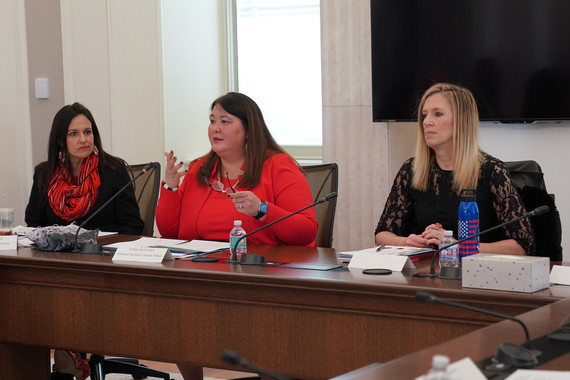
- Details
- By Native News Online Staff
WASHINGTON — The first meeting of the Missing and Murdered American Indians and Alaska Natives Presidential Task Force, now designated as Operation Lady Justice task force, was held in Washington, D.C. on Wednesday, January 29, 2020.
The Department of the Interior, Department of Justice and the Department of Health and Human Services oversee the Operation Lady Justice task force, which has a purpose to address the incidence of missing and murdered American Indians and Alaska Natives that is of epidemic proportion in Indian Country.
After the task force’s first meeting, officials held a telephone press conference with the members of the media and announced the task force will hold a listening session at the National Congress of American Indians (NCAI) Executive Council Winter Session in Washington, D.C. on February 12, 2020. The goal is to have other tribal consultations in Indian Country, but the schedule with times and locations was not announced on Wednesday. Officials expect to announce additional consultation in the coming weeks.
Also, during the press conference, officials announced Marcia Good was appointed executive director of the task force. Since 2013, Good has served as senior counsel to the Director of the Office of Tribal Justice at the U.S. Department of Justice. Prior to joining the Office of Tribal Justice, she served as an assistant U.S. Attorney in the District of Montana for 14 years.
While named Operation Lady Justice, officials say the task force will expand to include Indigenous men who go missing and murdered.
The Operation Lady Justice task force is empowered to review Indian Country cold cases, to strengthen law enforcement protocols, and work with tribes to improve investigations, information sharing and a more seamless response to missing persons investigations.
In addition to hosting regional tribal consultations and listening sessions, the task force will:
- Develop model protocols and procedures for addressing both new and unsolved cases of missing and murdered persons in tribal communities;
- Establish a multi-disciplinary, multi-jurisdictional team, which will include tribal law enforcement, to review cold cases;
- Address issues related to roles, authorities and jurisdiction among tribal, local, state and federal agencies; and
- Develop and execute a public awareness, education and outreach campaign for affected communities.
The members of the task force are:
- Katharine Sullivan, Principal Deputy Assistant Attorney General, Office of Justice Programs, designee for the Attorney General;
- Tara Sweeney, Assistant Secretary for Indian Affairs, designee for the Secretary of the Interior;
- Terry Wade, Executive Assistant Director, Criminal, Cyber, Response and Services Branch, Federal Bureau of Investigation;
- Laura Rogers, Acting Director, Office on Violence Against Women;
- Charles Addington, Deputy Bureau Director, Bureau of Indian Affairs, Office of Justice Services;
- Trent Shores, U.S. Attorney for the Northern District of Oklahoma and Chair of the Native American Issues Subcommittee of the Attorney General’s Advisory Committee; and
- Jean Hovland, Deputy Assistant Secretary for Native American Affairs and Commissioner, Administration for Native Americans, Department of Health and Human Services.
The task force will release a preliminary report to the President by November 26, 2020 and a final report listing its activities and accomplishments by November 26, 2021.
More Stories Like This
Native News Weekly (August 25, 2024): D.C. BriefsUS Presidents in Their Own Words Concerning American Indians
Rep. Grijalva Pepper-Sprayed by ICE Agents During Restaurant Raid
Next on Native Bidaské: Preserving Indian Health with A.C. Locklear
Hozhonigo Institute Helps Drive $34.5M in Grant Pipeline for Tribal Communities
Help us defend tribal sovereignty.
At Native News Online, our mission is rooted in telling the stories that strengthen sovereignty and uplift Indigenous voices — not just at year’s end, but every single day.
Because of your generosity last year, we were able to keep our reporters on the ground in tribal communities, at national gatherings and in the halls of Congress — covering the issues that matter most to Indian Country: sovereignty, culture, education, health and economic opportunity.
That support sustained us through a tough year in 2025. Now, as we look to the year ahead, we need your help right now to ensure warrior journalism remains strong — reporting that defends tribal sovereignty, amplifies Native truth, and holds power accountable.
 The stakes couldn't be higher. Your support keeps Native voices heard, Native stories told and Native sovereignty defended.
The stakes couldn't be higher. Your support keeps Native voices heard, Native stories told and Native sovereignty defended.
Stand with Warrior Journalism today.
Levi Rickert (Potawatomi), Editor & Publisher

